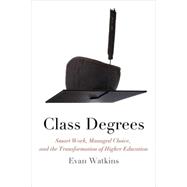Class Degrees Smart Work, Managed Choice, and the Transformation of Higher Education
, by Watkins, Evan- ISBN: 9780823229826 | 0823229823
- Cover: Hardcover
- Copyright: 9/15/2008
Since the 1980s there has been considerable discussion of the "vocationalizing" of universities in the U.S. Critics see a narrowing of focus to career objectives at the expense of a more broad-based humanities education and the citizenship training necessary to a democracy. There has been much less discussion, however, of the reform initiatives intended to change actual vocational education programs. In its beginnings early in the 20th century vocational education was designed to train a working class for massive industrialization. Influential figures like Charles Prosser insisted on a rigid separation between vocational and academic training. Students were to be taught limited and very job-specific skills. The reforms of the 1980s and 1990s in contrast were directed not only at making vocational training more "academic" in content, but also at transforming the psychology of student expectations toward the idea of middle class careers. This book argues that the complexities of vocational education reform can explain a great deal about how universities have changed. Rather than those paradise lost narratives that target training for jobs as the original sin, the argument is that both vocational education and university education must be understood within a larger context of class formation and structure. The reshaping of class processes signaled by vocational education reform initiatives has altered relations throughout the broad range of postsecondary education institutions, from technical schools to research universities. Thus it becomes especially important for those of us teaching in the humanities to understand significant structural shifts that affect our fields. As continually dwindling cultural capital fails to sustain fields like literary study, the role of the humanities becomes increasingly managerial. Humanities faculty are positioned to manage, assess, and ultimately attempt to contain the often contradictory effects imposed by the educational production of labor in the terms required by class formation.






